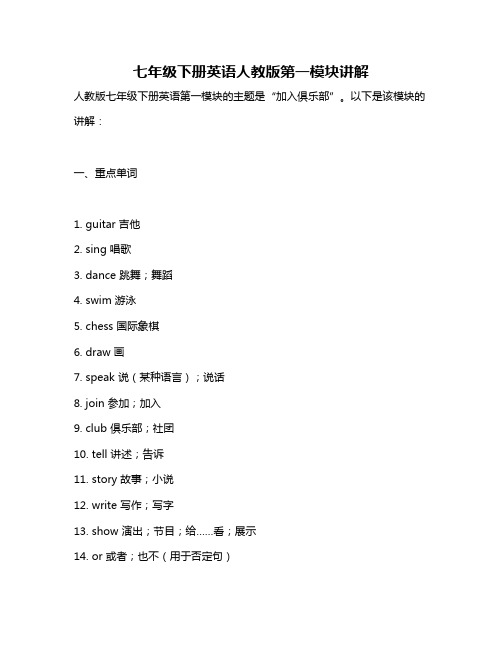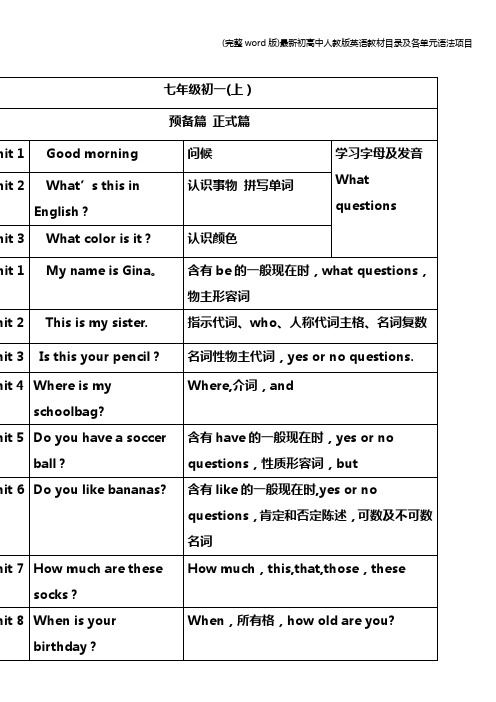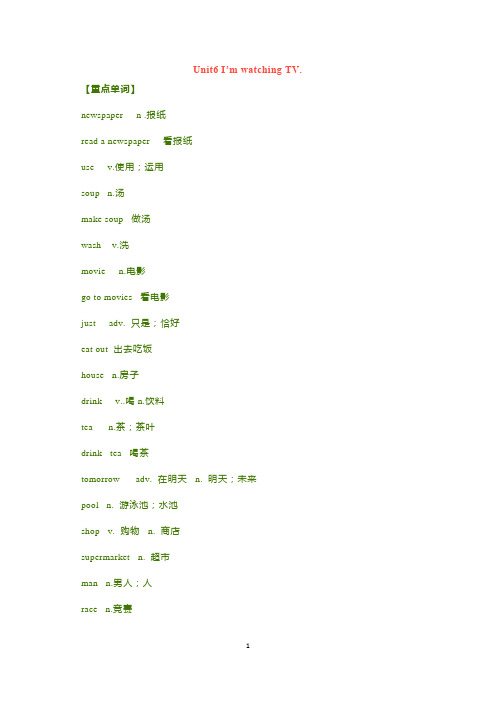完整word版,人教版英语七年级下册教材详解
七年级下册英语人教版第一模块讲解

七年级下册英语人教版第一模块讲解人教版七年级下册英语第一模块的主题是“加入俱乐部”。
以下是该模块的讲解:一、重点单词1. guitar 吉他2. sing 唱歌3. dance 跳舞;舞蹈4. swim 游泳5. chess 国际象棋6. draw 画7. speak 说(某种语言);说话8. join 参加;加入9. club 俱乐部;社团10. tell 讲述;告诉11. story 故事;小说12. write 写作;写字13. show 演出;节目;给……看;展示14. or 或者;也不(用于否定句)15. talk 说话;交谈二、重点短语1. play chess 下国际象棋2. speak English 说英语3. be good at… 擅长于……4. help sb. (to) do sth. 帮助某人做某事5. help sb. with sth. 在某方面帮助某人6. It is + adj + (for sb) to do sth. 做某事(对于某人来说)是……的。
7. teach sb. to do sth 教某人做某事。
三、重点句型1. I want to join the art club. 我想加入美术俱乐部。
2. You’re very good at telling stories. 你很擅长讲故事。
3. Can you sing or dance? 你会唱歌或者跳舞吗?4. I want to join the art club. 我想参加艺术俱乐部。
5. What club do you want to join? 你想要参加什么俱乐部?6. You’re very good at tellin g stories, but I also like drawing. 你很擅长讲故事,但我也喜欢画画。
7. It is fun to play the guitar in the club. 在俱乐部里弹吉他很有趣。
7年级下册英语人教版

7年级下册英语人教版人教版七年级下册英语教材是中国国内一所重点出版社编写的教材,用于七年级学生学习英语。
该教材分为八个单元,涵盖了丰富的课文、习题和活动内容,以帮助学生提高他们的英语听、说、读、写的能力。
第一单元是《How Do You Study for a Test?》,主要介绍如何备考考试的方法。
课文中给出了一些建议,例如设定明确的学习目标、制定合理的学习计划、做好笔记等等。
通过这个单元,学生可以学到一些实用的学习方法,提高他们的学习效果。
第二单元是《I'm more outgoing than my sister.》,主要介绍比较级和最高级的用法。
课文中通过描述两个姐妹的性格差异,引导学生学习比较级和最高级的构成规则。
通过这个单元,学生可以学会如何用英语比较两个或多个事物。
第三单元是《Could you please clean your room?》,主要介绍如何提出请求和道歉。
课文中给出了一些常用的礼貌用语,如“Could you please...”和“Sorry, I can't”。
通过这个单元,学生可以学会如何用合适的方式提出请求和道歉。
第四单元是《Why don't you talk to your parents?》,主要介绍如何表达建议。
课文中给出了一些建议的表达方式,如“Why don't you...”和“You should...”。
通过这个单元,学生可以学会如何用英语给别人提出建议。
第五单元是《Do you want to watch a game show?》,主要介绍如何表达兴趣和意愿。
课文中给出了一些常用的表达方式,如“I want to...”和“I would like to...”。
通过这个单元,学生可以学会如何用英语表达自己的兴趣和意愿。
第六单元是《I'm going to study computer science.》,主要介绍将来时的用法。
(完整word版)最新初高中人教版英语教材目录及各单元语法项目

Unit 6
Do you like bananas?
含有like的一般现在时,yes or no questions,肯定和否定陈述,可数及不可数名词
Unit 7
How much are these socks?
How much,this,that,those,these
Unit 2
What time do you go to school?
Whattime,when, 频率副词
Unit 3
How do you get to school?
How , how long, how far
Unit 4
Don’t eat in class。
祈使句,can, 情态动词
Unit 5
Unit 3
Under the sea
被动语态及-ing形式被动语态
Unit 4
Sharing
限制性定语从句
Unit 5
Traveling abroad
非限制性定语从句
Unit 1
Women of achievement
主谓一致
Unit 2
Working the land
-ing形式作主语宾语
Unit 3
Ataste ofEnglishhumor
—ing形式作表语定语宾补
Unit 4
Body language
-ing形式作定语状语
Unit 5
Theme parks
How often,频率副词
Unit 3
I’m more outing than my sister。
完整word版,七年级下册英语第一单元知识重点

Unit 11.sing(动词,唱歌)--singer(名词,歌唱家)2.swim(动词,游泳)--swimmers(名词,游泳者)3.dance(动词,跳舞)--dancer(名词,舞蹈家)4.Piano(名词,钢琴)—painist(名词,钢琴家)5.Violin(名词,小提琴)--violinist(名词,小提琴家)27.Music(名词,音乐)--musician(名词,音乐家)★Play与表示棋类、体育活动的名词连用时,中间不用任何冠词。
表示弹奏乐器时,乐器的名词前加the1.play the guitar 弹吉他2.play the piano弹钢琴3.play chess 下国际象棋4.play baseball打棒球★Play作玩耍时常用作不及物动词,play with则相当于及物动词,后面跟宾语,表示“以……自娱”1.Don’t play with fire/water.(不要玩火/水)2.The children are playing by the lake.(孩子们正在湖边玩)★Play a part in…意思为“参与某事;在…方面起作用”后接名词、代词或动词的ing形式。
1.Everyone should play a part in saving the earth.(每个人都应该参与到拯救地球的行列中去)★动词play作“演奏曲子”;“扮演”,如1.He often plays some light music for me.(他经常给我演奏一些轻音乐)2.We have to play the same piece again and again every day.(我们不得不每天演奏同一首乐曲)3.He played Lu Xun in the film.(他在电影中扮演鲁迅)★Play a role in…意思是“在…中发挥作用/扮演角色”1.When people watch the show,they usually play a role in deciding the winner. (当人们观看表演时,他们通常发挥决定冠军的作用)2.Fan Bingbing plays an important role in the film.范冰冰在这部电影中扮演一个重要的角色Speak说某种语言的能力或方式speak+某种语言“讲各种语言”1.I can speak Chinese and a little English(我会说汉语和一点英语)2.May I speak to Lucy?(我可以和Lucy通话吗?)3.Who will speak at the meeting?(谁将在会上发言?)4.The baby is too young to speak.(这个婴儿太小不会说话)Tell告诉1.tell sb.sth.==tell sth to sb告诉某人某事My teacher often tells us some interesting stories.== My teacheroften tells some interesting stories to us.2.tell sb (not )to do sth.“告诉某人不要做某事”Tell him (not) to close the door.3.tell sb.about sth.告诉某人关于某事.Please tell us about your school.tell a story/tell stories“讲故事”4.You are good at telling stories.5.tell(sb.) a lie/lies.(对某人)撒谎Don’t tell lies!别撒谎!辨析:Join 与take part inJoin 加入某一组织,成为其中一员其后还可以接表示人的名词或代词Join the partyJoin the leagueJoin the armyJoin the clubtake part in 参加会议或群众性活动强调句子主语参加该项活动,并在其中发挥作用Take part in the meetingTake part in the Olympic Gamesl(参加奥林匹克运动)★.be good at<介词>...=do well in<介词>...擅长...Eg:1.I am good at playing computer games.= I do well in playing computer games.★.be good for“对...有益”反义词 be bad for“对...有害”Eg:Running is good for your health.“跑步有益于你的健康”★.tell a story/tell stories“讲故事”★.Write to sb.“给某人写信”★.Show sb sth=show sth to sb.“給某人看某物”★.Be good with“善于应付...的”Eg: She is good with chindren.★.Made friends with sb.”与人交朋友“★.Help sb. with sth“在某方面帮助某人”=help sb. to do sth.★.on the weekend在周末★.Teach sb. to do sth教某人去做某事★.Need做实意动词,其后应接to do形式,但当情态动词讲时,其后应接动词原形。
人教版七年级英语下册-Unit 6:知识点总结+单元测试(word版,含答案)

Unit6 I’m watching TV.【重点单词】newspaper n .报纸read a newspaper 看报纸use v.使用;运用soup n.汤make soup 做汤wash v.洗movie n.电影go to movies 看电影just adv. 只是;恰好eat out 出去吃饭house n.房子drink v..喝n.饮料tea n.茶;茶叶drink tea 喝茶tomorrow adv. 在明天 n. 明天;未来pool n. 游泳池;水池shop v. 购物 n. 商店supermarket n. 超市man n.男人;人race n.竞赛host n.主人;东道主study v./n. 学习;研究state n. 洲the United States 美国;美利坚合众国American adj. 美国的;美洲的n. 美国人;美洲人dragon n.龙Dragon Boat Festival 端午节any adj. 任何的,任一的 pron. 任何;任一other adj. 另外的;其他的 pron. 另外的人(或物)young adj. 幼小的,年轻的children n. 儿童miss v.怀念. 思念wish v. 希望delicious adj. 可口的,美味的still adv. 还.仍然living room 客厅【重点短语】1.watch TV看电视2. read a newspaper 看报纸3. talk on the phone 通过电话交谈4. listen to a CD 听CD5. a useful book 一本有用的书6. make soup 做汤7. wash the dishes 洗碟子8. go to the movies 去看电影9. at home 在家10. eat out 在外面吃11. drink tea 喝茶12.Dragon Boat Festival 端午节13. make zongzi 包粽子14. watch the boat races 看龙舟比赛15. the night before the festival 节日前的晚上16. any other night 任何其他的晚上17. his host family 他的寄宿家庭18. read a story to sb 读故事给某人19. miss sb. 思念某人miss doing sth 错过做某事20. wish to do sth希望做某事wish sb to do sth希望某人做某事hope to do sth希望做某事21. no place like home 没有地方像家一样22. in the United States 在美国23. study for a test 为一个考试而学习【重点句型】1.一What are they doing?他们在干什么?—They’re listening to a CD.他们在听光碟。
word完整版人教版初中英语七年级下册Unit3SectionB教材全解

人教版初中英语七年级下册Unit3SectionB教材全解Unit 3 How do you get to school?Unit 3 Section B教材全解1.bus stop 公共汽车站【重点注释】stop,此处用作名词,意为“车站;站点”。
例如:at a/the bus stop 在公共汽车站。
stop一般指的是小站,停车点,如路边的停车站点;station指的是总站,大型的车站,at a bus/train/subway station。
例如:They wait for Jim at the bus stop.他们在公共汽车站等吉姆。
Where si the bus station?公共汽车站在哪儿?例句:Let's stop to have a rest.让我们停下来(原来干的事),(再去)休息一下吧。
Stop talking,please.请停止(正在)说话(这个事)。
They stop to smoke a cigarette.他们停下来(原来干的事),(然后)抽了根烟。
I must stop smoking.我必须戒烟了(我必须停止正在抽烟这个事)。
2.Mary wants to know where Bob lives.玛丽想知道鲍勃住在哪儿。
Mary wants to know what he thinks of the trip.玛丽想知道他(鲍勃)认为这段旅程怎么样。
【重点注释】①Mary wants to know where Bob lives.玛丽想知道鲍勃住在哪儿。
本句含有一个由连接词where引导的宾语从句。
在复合句中用作宾语的从句叫宾语从句。
无论主句是陈述句还是疑问句,宾语从句都必须使用陈述语序,即“主句+连词+宾语从句(主语+谓语+……)”句式。
如果主句的谓语动词是一般现在时,从句的谓语动词可根据需要,选用相应的任何时态。
例如:Please tell me whoknows the answer.请告诉我谁知道答案。
人教版七年级英语下册第二单元知识点汇总[2]
(直打版)人教版七年级英语下册第二单元知识点汇总(word版可编辑修改) 编辑整理:尊敬的读者朋友们:这里是精品文档编辑中心,本文档内容是由我和我的同事精心编辑整理后发布的,发布之前我们对文中内容进行仔细校对,但是难免会有疏漏的地方,但是任然希望((直打版)人教版七年级英语下册第二单元知识点汇总(word版可编辑修改))的内容能够给您的工作和学习带来便利。
同时也真诚的希望收到您的建议和反馈,这将是我们进步的源泉,前进的动力。
本文可编辑可修改,如果觉得对您有帮助请收藏以便随时查阅,最后祝您生活愉快业绩进步,以下为(直打版)人教版七年级英语下册第二单元知识点汇总(word版可编辑修改)的全部内容。
Unit 2 What time do you go to school?child –children (pl。
)孩子 tooth –teeth (pl.) 牙齿go to work 上班(反义词 go home) go to bed 睡觉(反义词get up)短语句子what time 几点钟 get up 起床 get home到达家中 go to class上课 go to school 上学come back 回来 get dressde穿衣服 brush teeth刷牙get/be dressed in+衣服名词或颜色名词表示穿着…衣服或…颜色的衣服be in+颜色(穿戴…颜色衣服/帽子) dress sb.给某人穿衣 dress oneself某人自己穿衣服put on 穿上(反义词take off)do one’s homework 做家庭作业 have an interesting job 有一份有趣的工作talk about yourself谈论你自己work at the radio station 在电台工作 your radio show 你的广播节目make breakfast做早饭 eat quickly 吃得快 eat vegetables 吃蔬菜eat breakfast =have breakfast/dinner/lunch 吃早、晚、午饭have sth。
(完整版)新人教版英语七年级上册教材(word版)
Unit 1 My name’s Gina.Language Goals: Introduce yourself;Greet people;Ask for and give telephone number语言目标:介绍自己;问候他人;询问和告知电话号码1aWrite English words for thethings in the picture.写出图中物品的英文名称。
_____map________1b Listen and number the conversations[1-3].听录音,为对话编号。
□A: What’s your name? □A: Good morning! □A: Hi. My name’s Gina.B: Alan. B: I’m Cindy. B: I’m Jenny. Nice to meet you!A: Hello, Alan. I’m Ms Brown. B: Hello, Cindy. I’m Dale. A: Nice to meet you, too.A: Nice to meet you!1c Practice the conversations above with your partner. Then greet your classmates.练习上面的对话,然后问候你的同学。
2a Listen to the conversations and number the pictures [1—4].听对话,为图片编号。
2b Listen again. Circle the names you hear.再听一遍录音,圈出你听到的名字。
Eric Tom Alice Bob Mike Jack Mary Ms. Miller2c Practice the conversations in pairs.两人一组练习下面的对话。
A: Hello! What’s your name A:What’s his name?B: My name’s… B:His name is…A: I’m…A: And what’s her name?B: Nice to meet you! B: Her name is…2d Role play the conversation. 分角色表演对话Linda: Good afternoon! My name’s Linda.Are you Helen?Helen: Yes, I am. Nice to meet you, Linda.Linda: Nice to meet you, too. What’s hername?Helen: She’s Jane.Linda: Is he Jack?Helen: No, he isn’t.His name’s Mike.What’s your name?Alan. /I’m Alan./My name’s Alan.What’s his name?He’s Eric./ His name’s Eric.What’s her name?She’s Mary. / Her name’s Mary.Is he Jack? Yes, he is. / No, he isn’t. His name’s Mike.Are you Helen? Yes, I am. / No, I’m not. I’m Gina.what’s = what is name’s = name is I’m = I amhe’s = he is she’s = she is3a Put the words in order to make conversations. Then practice them.调整词序,组成对话并练习。
七年级英语下册教案
七年级英语下册教案篇一:2022人教版七年级下册全册英语教案英语七年级(下)教案一、【教学目标】(一)语言知识1.词汇掌握wake,early, first,day, term,must,still,by,onfoot,the same to,usually,always,Ms.,boat,ship,sea,train,by plane/air/airplane, etc.2.理解Subway Worm reporter,Net Bar,roller skating Measuredining hall,dormitory bookstore,etc. (二)语法1.一般现在时(Simple present)2.频度副词(Adverbs of frequency)never, seldom, sometimes,often, usually, always, once, twice3.现在进行时(Present continuous) a. I’m looking for a book.b. Are you doing your homework? Yes, I am./No, I’m not.c. Is he/she...?Yes, he/she is. /No, he/she isn’t.d. What are you doing now? I’m playing computer games.e. What is he/she doing? He/She is...4.谈论交通方式(Talking about means of transportation) How do you usually go to school? I usually go to school by bike. (三)功能用语与话题1.采访(Interviews)Our guest today is Michael from Class 2, Grade 1.2.谈论日常生活(Talking about routines)3.学校建筑(School buildings)swimming pool, playground,library, dormitory, lab, gym4.谈论兴趣喜好(Talking about interests, likes and dislikes)I like the swimming pool best. Why do you like English? Because it’s interesting and easy. 5.借物(Borrowing things)How long can I keep it? Two weeks. 6.新闻(News)、海报(Poster)Attention,please! Here is the news.7.谈论学校活动、科目和时间表(Talking about school activities,subjects and timetable) 8.谈论学校生活(Talking about school life)(四)能力培养【听】能听懂谈论校园生活中比较熟悉的话题,识别主题,获取主要信息。
人教版七年级英语下册初一下册电子课本word文档
Unit 1. Can you play the guitar? Section A【音频材料】***************************************** 1aWhat can these people do? Match the activities with the people.1.Sing _____2.Swim_____3.Dance_____4.Draw_____5.Play chess_____6.Speak English_____7.Play the guitar______***************************************** 1bListen and number the conversation [1-3]. ( ) A: Can you swim?B: No, I can’t.( ) A: I want to join the art club.B: Can you draw?A: Yes, I can.( ) A: I want to join the music club.B: Oh, can you sing?A: Yes, I can.【音频材料】*****************************************1cPractice the conversations above with yourpartner. Then make your own conversations. 【音频材料】***************************************** 2aListen to these two conversations and circle the clubs you hear.【音频材料】***************************************** 2bListen again. Complete the sentence.1.Lisa wants to join the ______ club, but she can’t play_______.2.Bob wants to join the _______club. He likes to speak___.3.Mary likes music. She can ______ and ______. Bob likes music, too. They want to join the_____ club.【音频材料】***************************************** 2cLook at 2b and talk about what the people can do and the clubs they want to join.【音频材料】What club does Lisa want to join?She wants to join the……***************************************** 2dRole-play the conversation.Jane: Hi, Bob. What club doyou want to join?Bob: I want to join a sportsclub.Jane: Great! What sports can you play?Bob: Soccer.Jane: So you can join the soccer club.Bob: What about you? You’re very good at telling stories. You can join the story telling club. Jane: Sounds good. But I like to draw, too.Bob: Then join two clubs, the story telling club and the art club!Jane: OK, let’s join now!【音频材料】Hi, Bob. What club do you want to join?***************************************** Grammar Focus***************************************** 3aWrite questions and answers with the words and phrases.1.Wu Jun/ speak English/ speak ChineseCan Wu Jun speak English? No, he can’t, but he can speak Chinese.2.Mike/ play basketball/ play tennis_______________________________________ 3.Jane and Jill/ dance/ sing_______________________________________ 4.Grace/ play soccer/ play volleyball______________________________________ 5.Bill/ write stories/ tell stories_______________________________________ ***************************************** 3bComplete the poster with the words in the box.play sing tell danceStudents Wanted for School ShowWe want students for the school show. Can you_____ or _____? Can you ______ the guitar? Can you ______ stories? Please talk to Mr. Zhang after school.***************************************** 3cWhat can your group do in the school show? Make a list.What can you do, Li Xin?I can do kung fu.*****************************************11。
- 1、下载文档前请自行甄别文档内容的完整性,平台不提供额外的编辑、内容补充、找答案等附加服务。
- 2、"仅部分预览"的文档,不可在线预览部分如存在完整性等问题,可反馈申请退款(可完整预览的文档不适用该条件!)。
- 3、如文档侵犯您的权益,请联系客服反馈,我们会尽快为您处理(人工客服工作时间:9:00-18:30)。
人教版英语七年级下册教材详解1、1)live on 以…为食;以…为生Tigers live on meat.2)live in 住在某地He lives in Beijing.2、dislike 不喜欢(=don’t/doesn’t/didn’t like)如:I dislike to go to the cinema.3、重点句子1)Where is he from ? = Where does he come from?2)He is from Japan. = He doesn’t come from Japan.3)Where does he live ? ----He lives in Tokyo.4)Please write to me soon. (write to sb. 写信给某人= write a letter to sb.)Unit 21、street 表“街道”,短语:on/ in the street 在街道上。
2、介词短语⑴ near 在…附近⑵ next to 紧挨着⑶ across from在…对面⑷ between ….and… 在A和B之间⑸ in front of 在…外面的前面:There is a tree in front of a house.⑹ in the front of在…里面的前面:The teacher is in the front of the classroom.⑺ behind 在…外面的后面:The ball is behind the door.⑻ in the back of 在…里面的后面My friend sits in the back of the classroom.3、through, across,over, 和past都是介词,不能单独做谓语,必须与动词连用才能做谓语。
1)through 从物体内部穿过,如:walk through a forest. 穿过一个森林2)past 从物体外面绕过, 如:walk past a post office 经过一个邮局3)across 从物体表面横穿,如:go across the road 横穿马路4)over 从物体上空越过, 如:fly over the city 飞过城市【注意】pass(经过),cross (横穿) 都是动词,可作谓语,相当于“动词+past/across”.如:①I pass (walk past) a post office every day. ② Don’t cross (walk across) the road.4、straight ⑴形容词,笔直的,直的:She has straight hair. 她长着直发。
⑵副词,直接地Go straight down the road and then turn left.5、turn (1)动词,拐turn left 向左拐(2)名词,拐弯No left turn ! 禁止左拐弯6、on the right 在右边,on the left 在左边7、open (1)动词,打开Open the door. (2)形容词,开着的The door is open.【注意】close 动词,关→closed 形容词,关着的。
The door is closed.8、clean (1)动词,打扫He is cleaning the room. (2)形容词,干净的The room is clean.9、Welcome to + 名词,表欢迎到某地Welcome to China. 但Welcome back home.(home 为副词,副词可以直接修饰动词。
因此,前不用介词to)10、enjoy doing sth. 喜欢做某事(enjoy 后只能接动名词v-ing)I enjoy . (read)11、walk 可作名词,如:take a walk 散步;twenty minutes’ walk 20分钟的步行12、beginning 名词,开始It’s a good beginning. 那是一个好的开端。
短语有:the beginning of …的开始;at the beginning of 在,,, 的开始;in the middle of 在…的中间;at the end of 在…的最后13、visit (1)及物动词①参观,访问visit Beijing ②探望visit my grandpa.(2)名词,短语:on a visit to 参观某地They are on a visit to Beijing. = They are visiting Beijing.14、have fun 玩得开心,过得愉快= enjoy oneself = have a good timehave fun doing sth. 在做某事中过的很愉快I have fun English. (learn)15、hope 希望,后不接双宾语,既不能说hope sb. to do sth. 如:I hope him to help me.(×)但可接宾语从句,此句可改为I hope (that ) he can help me.16、重点句子:(1)问路①Where is the hotel ? ----It’s next to / behind/ in front of the school.② Can you tell me the way to the hotel ? (the way to 去某地的路)(2) 指路Go straight and turn left at New Park . 笔直往前走,在新公园向左拐。
Go through Six Avenue .穿过六街Go down the street and it’s on your left. 沿着街往下走,它在你的左边。
Unit 31、动物名称词tiger, elephant, dolphin, panda, lion, penguin企鹅, giraffe长颈鹿, koala.树袋熊2、形容词:cute可爱的, clever 聪明的,smart聪明可爱的, ugly 丑陋的,friendly 友好的;beautiful 漂亮的;shy 害羞的;lazy 懒惰的。
3、(1) other 形容词,别的,其他的。
What other things do you want? = What else do you want ?(2) others 代词,还有一些。
常与some 连用。
(some…, some…,others…一些…., 一些…,还有一些)如: There are many flowers, some are red, some are white, others are yellow..(3) another 表又一个,另一个。
Have another cup of tea. 再喝一杯茶(已经喝了几杯)(4) the other (两者中)剩下的I have two pen,. One is red, the other (one ) is black.(5) the others 其余的人或物There is only ten boys in my class, the others (=the otherstudents) are boys.【注意】others 和the others 是代词,代替一些人或物。
它们后不加名词,用法同名词性物主代词(yours, hers, ours….)4、sleep 动词,睡觉。
从上床到熟睡的过程有:feel sleepy感到困倦→ go to bed上床→ fall asleep/ go to sleep入睡→ be asleep / sleeping 睡着了→wake up醒来→ be awake醒着的Last night, I felt sleepy. And I went to bed early. After reading some stories, I fell asleep.When I was sleeping, the clock woke me up. Since then, I was awake till the next morning.4、during 表在…期间,常可以与in 替换。
如:during the day = in the day 在白天。
5、at night = in the night 在晚上6、relax 动词,放松,休息。
We can relax (ourselves) on weekends.【扩展】relaxing 令人放松的,轻松的。
Relaxed 感到放松的。
加ing 表“令人…的”,加ed表“感到…的”,类似的词有:exciting(令人兴奋的), excited(感到兴奋的);interesting(令人感到有趣的),interested(感到有趣的),surprising 令人感到吃惊的,surprised 感到吃惊的。
8、play with ⑴和某人玩I like to play with you (2)玩弄某物Look, the boy is playing with abasketball. (比较:play with a basketball玩篮球;play basketball 打篮球)9、重点句子:(1)What animal do you like ? 你喜欢什么动物?(2)What other animals do you like ? 你还喜欢别的什么动物?(3)Why do you like dogs? ---- Because they are friendly and clever. (Why问句用because 答)Unit 41、give sb. sth 给某人某物= give sth. to sb. 把某物给某人Give me the book. = Give the book to me.2、put on 穿→ wear 穿着;①He got up quickly, and his uniform.②Look, he is a uniform.3、teach sb. sth. 教某人某事,不能说成teach one’s sth 教某人的某事。
Mr Liu teaches our English。
(改错)→ 。
4、kind of = a little一点My work is kind of dangerous.A kind of 一种Dogs are a kind of friendly animals.5、go out to dinners 到外面吃饭,下馆子。
